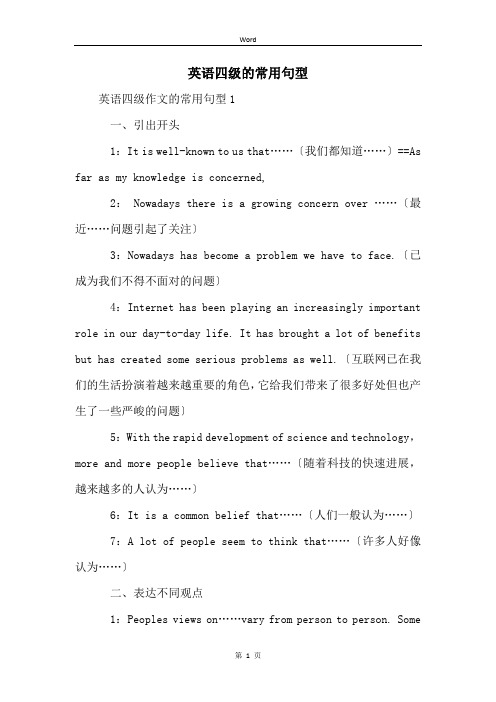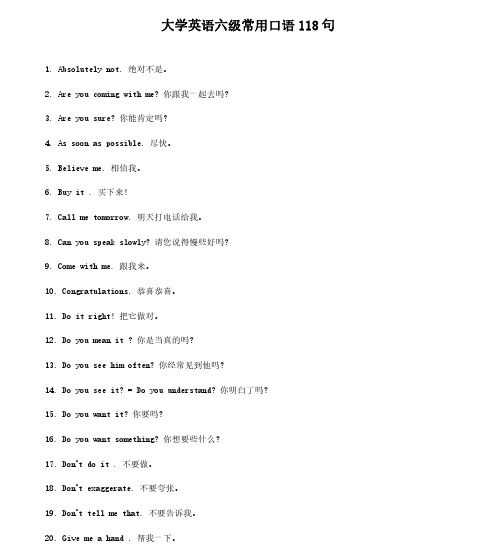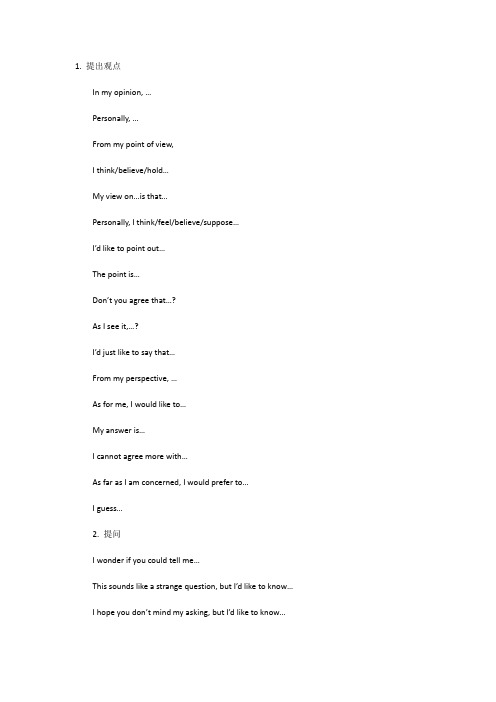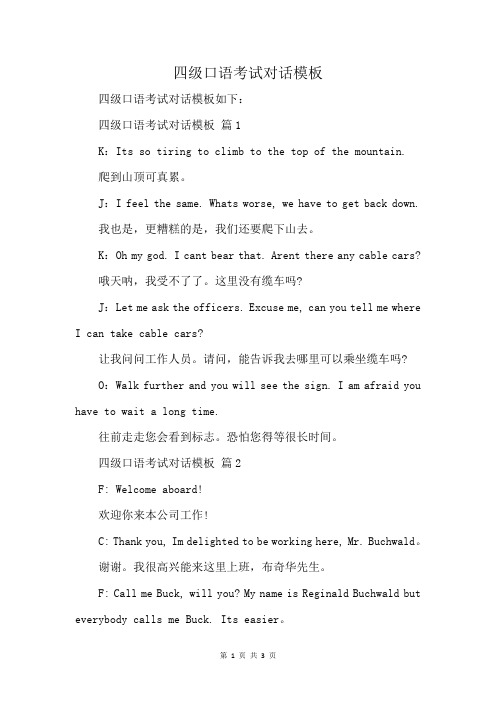最新四六级口语常用句型
英语四级的常用句型

英语四级的常用句型英语四级作文的常用句型1一、引出开头1:It is well-known to us that……〔我们都知道……〕==As far as my knowledge is concerned,2:Nowadays there is a growing concern over ……〔最近……问题引起了关注〕3:Nowadays has become a problem we have to face.〔已成为我们不得不面对的问题〕4:Internet has been playing an increasingly important role in our day-to-day life. It has brought a lot of benefits but has created some serious problems as well.〔互联网已在我们的生活扮演着越来越重要的角色,它给我们带来了很多好处但也产生了一些严峻的问题〕5:With the rapid development of science and technology,more and more people believe that……〔随着科技的快速进展,越来越多的人认为……〕6:It is a common belief that……〔人们一般认为……〕 7:A lot of people seem to think that……〔许多人好像认为……〕二、表达不同观点1:Peoples views on……vary from person to person. Somehold that……However, others believe that……〔人们对……的观点因人而异,有些人认为……然而其他人却认为……〕4:There are different opinions among people as to……〔对于……人们的观点大不相同〕三、表示结尾1:In short, it can be said that……〔总之,他的意思是……〕 2:From what has been mentioned above, we can come to the conclusion that……〔从上面提到的,我们可以得出结论……〕3:Taking all these factors into consideration, we naturally/reasonably come to the conclusion that……〔把全部的这些因素加以考虑,我们自然可以得出结论……〕4:Therefore, wed better come to the conclusion that……〔因此,我们最好的出这样的结论……〕 5:There is no doubt that 〔毫无疑问,6:All in all, we cannot live without……,but at the same time we must try to find out new ways to cope with the problems that would arise.〔总之,我们没有……无法生活,但同时我们必需寻求新的解决方法来面对可能消失的新问题〕四、提出建议1:It is high time that we put an end to the (trend).〔该是我们停止这一趋势的时候了〕2:There is no doubt that enough concern must be paid tothe problem of……〔毫无疑问,对……问题应予以足够重视〕 3:Obviousl y ,if we want to do something … it is essential that……〔明显,假如我们想要做么事,很重要的是……〕 4:Only in this way can we ……〔只有这样,我们才能……〕五、预示后果1:Obviously,if we dont control the problem, the chances are that……will lead us in danger.〔很明显,假如我们不能掌握这一问题,很有可能我们会陷入危急〕2:No doubt, unless we take effective measures, it is very likely that ……〔毫无疑问,除非我们实行有效措施,否则我们很可能会……〕3:It is urgent that immediate measures should be taken to stop the situation〔很紧迫的是应马上实行措施阻挡这一事态的进展〕六、表示论证1:From my point of view, it is more reasonable to support the first opinion rather than the second.(在我看来,支持第一种观点比其次种更有道理)2:I cannot entirely agree with the idea that……〔我无法完全同意这一观点〕3:As far as I am concerned/In my opinion,……〔就我来说……〕4:I am greatly convinced (that)子句.〔我真诚地信任……〕 5:Finally, to speak frankly, there is also a more practical reason why ……〔最终,坦率地说,还有另外一个实际的缘由……〕更多英语资料加微信aaaeyy七、给出缘由1:The reason why + 句子 ~~~ is that + 句子〔...的.缘由是...〕3:On the one hand,……On the other hand……一方面……另一方面……4:I quite agree with the statement that……The reasons are chiefly as follows.我非常赞同这一论述,即……。
大学英语六级常用口语118句

大学英语六级常用口语118句1.Absolutely not.绝对不是。
2.Are you coming with me?你跟我一起去吗?3.Are you sure?你能肯定吗?4.As soon as possible.尽快。
5.Believe me.相信我。
6.Buy it.买下来!7.Call me tomorrow.明天打电话给我。
8.Can you speak slowly?请您说得慢些好吗?e with me.跟我来。
10.Congratulations.恭喜恭喜。
11.Do it right!把它做对。
12.Do you mean it?你是当真的吗?13.Do you see him often?你经常见到他吗?14.Do you see it?=Do you understand?你明白了吗?15.Do you want it?你要吗?16.Do you want something?你想要些什么?17.Don‟t do it.不要做。
18.Don‟t exaggerate.不要夸张。
19.Don‟t tell me that.不要告诉我。
20.Give me a hand.帮我一下。
21.Go right ahead.一直往前走。
22.Have a good trip.祝旅途愉快。
23.Have a nice day.祝你一天过得愉快。
24.Have you finished?你做完了吗?25.He doesn‟t have time.他没空。
26.He is on his way.他现在已经在路上了。
27.How are you doing?你好吗?28.How long are you staying?你要呆多久?29.I am crazy about her.我对她着迷了。
30.I am wasting my time.我在浪费时间。
31.I can do it.我能做。
六级口语模板万能句型

六级口语模板万能句型作为英语学习的一个重要部分,口语是检验学习成果的重要手段之一。
然而每个人的口语能力都有差异,一些人面对口语考试会比较紧张而发挥不好。
今天,本文将会为大家介绍一些六级口语模板和万能句型,帮助大家更好地备考口语考试。
一、开头万能句型在口语考试的开头,我们需要有一个好的引子来引入我们想要表达的内容。
以下是一些典型的开头万能句型:1. Hello everyone, my name is XX, and I am really glad to be here today.2. Good morning/afternoon/evening, ladies and gentlemen. Thank you for giving me this opportunity to speak here today.3. As an old saying goes, “XXXXXXXXXX” (引用一则名言). Based on this concept, today I’d like to talk about XXXXX.这些开头的句型虽然简单,但是足以引起考官的注意,让人们对你的演讲感到自然舒适。
二、论述万能句型在论述的过程中,我们最好能够使用一些万能句型来增加口语的准确性和说服力。
1. To begin with, let's take a look at the first argument for/against...2. Another reason why I believe...3. Furthermore, it has been proven that...4. As a matter of fact, research has shown that...这些句型很好地展示了我们的逻辑思维和语言功力,让我们的表述更加充实和有说服力。
三、结论万能句型一个漂亮的结论可以让我们印象深刻,把我们的观点明确地传递给考官。
六级口语回答短语万用模板

1. 提出观点In my opinion, …Personally, …From my point of view,I think/believe/hold…My view on…is that…Personally, I think/feel/believe/suppose…I’d like to point out…The point is…Don’t you agree that…?As I see it,…?I’d just like to say that…From my perspective, …As for me, I would like to…My answer is…I cannot agree more with…As far as I am concerned, I would prefer to…I guess…2. 提问I wonder if you could tell me…This sounds like a strange question, but I’d like to know…I hope you don’t mind my asking, but I’d like to know…Excuse me, do you happen to know…?3. 避免冷场Well, let us see…I’m not sure. I’ll have a quick check. Well, what I really want to say is that…What I mean is that…The point I’m trying to make is that…Let me put it another way.Actually, things like that…Yeah, I understand.4. 请求重复问题I’m afraid I didn’t quite catch you.I’m afraid I’m not quite clear about…Sorry, I’m afraid I can’t follow you. Sorry, I’m afraid I don’t get it.Could you repeat the question, please? Could you say that again, please?Do you mean that…?What did you say?5. 完全同意某一观点You bet!I’m with you.I’m on your side!You can say that again!I can’t agree with you anymore!Tell me about it!I couldn’t agree more!My own view is precisely the same.That’s exactly what I’m thinking about. Absolutely!/ Exactly!/ Alright!/ Certainly!I’m with you on that.I definitely would consent to…6. 部分同意某一观点Yes, but…/ That’s true, but…Mm, possibly. There is something in that.I see what you mean, but…Um…well I don’t know/maybe/I am not sure... It’s true that... but it’s also true that...7. 完全不同意某种观点I entirely disagree with you.I really couldn’t agree.I can’t say.That doesn’t make any sense.I wouldn’t buy it.8. 有礼貌地表示不同意某种观点I’m not sure.Well, that depends.I don’t think so, really.I’m afraid I can’t agree.I’m afraid I’m not convinced.No offense, but I think…Maybe I’m wrong, but I don’t think…Sorry, but I should say no about…9. 提出建议I was wondering if you’d ever thought of…Why don’t you…?You’d better…Perhaps we could…Have you ever thought of…?Don’t you think it might be a good idea to…? If I were you, I’d…Why not…?…should/ought to/be supposed to…We should properly…What…need to do is…Obviously, if we want to…, it is essential that…It is high time that we did something to…It is high time that something was done.Therefore, in order to…, effective means should be taken to…In short/In any case, we should/ought to/need…It is suggested that the government should take efforts to…10. 委婉地表达意见Sometimes I think that…Well, I’ve heard that…Wouldn’t you say that…?Do you think it’s right to say that…?10个四六级口语考试问答模板!模板一As is vividly revealed in the picture, (描述图画内容) . The picture reminds us of an old Chinese saying— (用合适的谚语进一步说明图画的含义) . Undoubtedly, the symbolic meaning conveyed in the picture is (揭示图画的深刻含义) . First, (分析第一条含义) . What’s more, (进一步阐述隐含的深刻含义). Therefore, when it comes to (总结主题), the most important thing lies in (总结深刻含义). In a word, (总结全文,提出建议). Only in this way can we (强调主题)模板二What the drawing vividly depicts is that (图画主题). The picture illustrates that (图画反映的现象). Those who favor (观点1) think that (原因). In contrast, people who hold the opposite opinion maintain that (观点2). They think that (原因). As far as I am concerned,(表达自己的观点). I suggest that (提出解决措施).模板三As is symbolically depicted in the drawing, (图画内容). Simply designed as the drawing seems to be, it does reveal that (主题). What the picture conveys goes far beyond this. Therefore, I strongly hold that (观点1). It is also of great significance to (观点2). Most importantly, (观点3).模板四As is vividly illustrated in the drawing, (图画内容). The drawing, thought-provoking as it is, does mirror a current social phenomenon that (主题). The implied meaning of the drawing should be taken into account seriously. To begin with, (揭示含义1). What’s more,(揭示含义2). In my view, (措施1). Meanwhile, (措施2). Only in this way can we (要实现的目标).模板五The drawing vividly depicts that (图画内容). The caption in the drawing reads (文字内容). What is conveyed in the drawing is realistic and most meaningful, which should arouse the great concern of the whole society. There may be a combination of factors which contribute to/are responsible for/explain (现象). First of all, (原因1). Secondly, (原因2). Moreover, (原因3). However, we should also notice that (现象). Indeed, these unique points can be collected to remind people that (采取的措施). In this way, (要实现的目标).模板六As is illustrated in the drawing, facing (问题), different people may have different attitudes. Some people tend to (态度1). Others, on the contrary, may (态度2). All in all, (个人观点). So we should (解决方案)模板七As the picture depicts, (图画的具体内容). The caption indicates (图画的标题). On the one hand, (原因1). On the other hand, (原因2). What’s more, (原因3). (图画主题) has been attached much importance. To sum up, it is significant for people to (结论). In my opinion, it is necessary to (措施). As a result, we can (预期目标).模板八As is shown in the pictures, we can see clearly that (存在的问题). In one picture, (图画1的内容). On the contrary, (图画2的内容). These pictures show us that due attention has to be paid to (现象). If we let this situation go as it is, (现象导致的后果). Therefore, it is imperative for us to take drastic measures. For one thing, we should (措施1). For another, we should (措施2). Only in this way can we (目标1). Also, I believe that (目标2).模板九As is demonstrated in the table, (图表的内容), which is a serious problem to (问题) as well as a hindrance to (问题). It is estimated that (预测内容). There are several reasons for this phenomenon. In the first place, (原因1). In the second place, (原因2). Last but not least, (原因3). Serious as the problem seems, we can come up with some measures to deal with it. On the one hand, (措施1). On the other hand, (措施2). With the joint efforts of all of us, (问题) will surely be solved soon.模板十It is described in the picture that (图画内容). The picture reveals that (图画反映的现象). It is the most essential quality that (提出观点). However, there are a lot of people who (持相反观点的人). Without (反证句1). Also, without (反证句2). Furthermore, (反证句3). In one word, (总结句). To (目标), we can do many things. To begin with, we should (措施1). What’s more, (措施2). Last but not least, (措施3). All in all, (总结).part 2回答思路:一句话回答+ 拓展(解释具体原因,进行具体阐述)。
英语四级口语对话场景20篇

英语四级口语对话场景20篇以下是20篇英语四级口语对话场景,每篇对话包含两个角色的交流,以及相应的中文翻译。
这些对话涵盖了日常生活、学习、工作等多个方面,有助于提高学生的口语表达能力和听力理解能力。
场景1:校园相遇A:Hi,long time no see.How's everything going?B:Hey,it's always a pleasure to see you.Everything's fine,thanks.You know,exams are coming up,so I've been studying a lot.A:Yeah,I hear you.Good luck with your exams!B:Thanks,I need it.翻译A:嗨,好久不见。
最近怎么样?B:嘿,见到你总是很高兴。
一切都好,谢谢。
你知道的,考试就要到了,所以我一直在学习。
A:是啊,我明白。
祝你考试顺利!B:谢谢,我需要这个祝福。
场景2:图书馆借书A:Excuse me,could you help me find a book?B:Sure,what book are you looking for?A:"The Great Gatsby"by F.Scott Fitzgerald.B:Ah,yes.It's in the literature section,over there on the second shelf. A:Thank you so much!B:No problem,enjoy your reading.翻译A:打扰一下,你能帮我找一本书吗?B:当然可以,你在找什么书?A:F·斯科特·菲茨杰拉德的《了不起的盖茨比》。
B:啊,是的。
它在文学区,那边的第二个架子上。
A:非常感谢!B:没问题,享受你的阅读。
六级口语套话

六级口语套话1. 请问你的名字是什么?- Could you please tell me your name?2. 你是哪里人?- Where are you from?3. 你是学生还是工作?- Are you a student or do you work?4. 你喜欢什么样的音乐?- What kind of music do you like?5. 你通常在周末做什么?- What do you usually do on weekends?6. 你喜欢看电影吗?- Do you like watching movies?7. 你有什么兴趣爱好?- What are your hobbies?8. 你喜欢旅行吗?- Do you enjoy traveling?9. 你会说其他语言吗?- Can you speak any other languages?10. 你有兄弟姐妹吗?- Do you have any siblings?11. 你觉得最困难的科目是哪个?- Which subject do you find the most difficult?12. 你最喜欢的食物是什么?- What is your favorite food?13. 你喜欢户外活动还是宅在家里?- Do you prefer outdoor activities or staying at home?14. 你擅长什么运动?- What sport are you good at?15. 你对未来有什么计划?- What are your plans for the future?16. 你有没有参加过什么社团或俱乐部?- Have you participated in any clubs or organizations?17. 你最近读过什么好书吗?- Have you read any good books recently?18. 你对学习英语有什么建议?- Do you have any tips for learning English?19. 你喜欢尝试新的事物吗?- Do you like trying new things?20. 你觉得什么是最重要的生活价值观?- What do you think is the most important value in life?。
四级口语考试对话模板

四级口语考试对话模板四级口语考试对话模板如下:四级口语考试对话模板篇1K:Its so tiring to climb to the top of the mountain.爬到山顶可真累。
J:I feel the same. Whats worse, we have to get back down.我也是,更糟糕的是,我们还要爬下山去。
K:Oh my god. I cant bear that. Arent there any cable cars?哦天呐,我受不了了。
这里没有缆车吗?J:Let me ask the officers. Excuse me, can you tell me where I can take cable cars?让我问问工作人员。
请问,能告诉我去哪里可以乘坐缆车吗?O:Walk further and you will see the sign. I am afraid you have to wait a long time.往前走走您会看到标志。
恐怕您得等很长时间。
四级口语考试对话模板篇2F: Welcome aboard!欢迎你来本公司工作!C: Thank you, Im delighted to be working here, Mr. Buchwald。
谢谢。
我很高兴能来这里上班,布奇华先生。
F: Call me Buck, will you? My name is Reginald Buchwald but everybody calls me Buck. Its easier。
叫我布客就可以了。
我的全名是雷奇纳客·布奇华,但是大家都叫我布客。
这样比较方便。
C: Id prefer to call you Mr. Buchwald. Isnt it rather disrespectful to make a nickname out of ones family name?我更愿意称呼您布奇华先生。
四级口语万能句子

四级口语万能句子四级口语万能句子:一、日常交往1. Hello, my name is [your name]. Nice to meet you. 你好,我叫[你的名字]。
很高兴认识你。
2. How are you?/ How have you been?你好吗?/最近怎么样?3. I'm good/fine, thank you. And you?我很好,谢谢。
你呢?4. What do you do for a living?你以什么为生?5. What are your hobbies?你的爱好是什么?6. What kind of music/movie do you like?你喜欢什么类型的音乐/电影?7. How was your weekend?你的周末过得怎么样?8. What are your plans for the evening?你今晚有什么计划?9. Have you ever been to [place]?你去过[地方]吗?10. Can you recommend a good restaurant around here? 你可以推荐附近的一个好餐厅吗?11. What do you think of [topic]?你对[话题]有什么看法?12. I'm sorry, I didn't catch that. Could you please repeat? 对不起,我没听清楚。
你能重复一下吗?13. Could you speak a bit slower, please?你可以说慢一点吗?二、购物和旅游1. How much does this cost?这个多少钱?2. Can I get a discount?可以打折吗?3. Where is the nearest mall/shopping center?最近的购物中心在哪里?4. Do you have this in a different size/color?你们有这个的其他尺码/颜色吗?5. I'm looking for a souvenir to bring back home.我想找一件纪念品带回去。
- 1、下载文档前请自行甄别文档内容的完整性,平台不提供额外的编辑、内容补充、找答案等附加服务。
- 2、"仅部分预览"的文档,不可在线预览部分如存在完整性等问题,可反馈申请退款(可完整预览的文档不适用该条件!)。
- 3、如文档侵犯您的权益,请联系客服反馈,我们会尽快为您处理(人工客服工作时间:9:00-18:30)。
1. What’s your name?2. Does your name have any special meaning?3. Where do you come from?4. What kind of landscape surrounds your hometown?5. What is the main crop in your hometown?6. What is the difference between Beijing and your hometown?7. What are the main places of interest in your hometown?8. What is the climate like in your hometown?9. What is the character of the people like in the region where you live?10. What are the differences in accent between the people of your hometown and Beijing?11. What is people’s favorite food in your region?12. How do you make dumplings?13. What do you do during the Spring Festival?14. Why is the Spring Festival so important to Chinese people?15. Can you describe one of the main festivals celebrated in your country?16. Tell me something about the Lantern Festival.17. Tell me something about the Qing Ming Festival.18. Tell me something about the customs of your country.19. How long have you lived in Beijing?20. What is the weather like in Beijing?21. How do you compare the climate in Beijing with that in your hometown?22. What place in Beijing do you like best? Why ?23. Which is the worst place you’ve been to China?24. Which is the best place you’ve been to China?25. What places in Beijing should a foreigner visit? Why?26. What are the major social problems in Beijing? How can they be solved?27. What is the biggest problem China faces?28. What places in Beijing should a foreigner visit? Why?29. Could you tell me something about your family?30. Have you any children?31. What is your child’s name? Does his name have a meaning?32. What does your wife/husband do?33. When did you get married?34. Describe your wedding.35. How have weddings changed in recent years?36. Are there any special customs about wedding in your region?37. Describe a traditional wedding ceremony.38. Where did you go for your honeymoon?39. Did you have to ask for permission from your parents before yougot married?40. Is it acceptable for couples to live together without marrying?41. Where do you think a newly couple should live? Living with their parents or on their own?42. What responsibilities should a couple take?43. How do Chinese usually celebrate birthdays?44. Are there any traditions concerning the birth of a baby?45. What kind of parent do you intend to be?46. What do you think of One-Child Policy in China?47. Why do people in China traditionally want to have a son?48. What difficulties do Chinese farmers have concerning their old age?49. What do you think needs to be done in order to relieve the farmer’s worries?50. What hope or fears do you have for your children?51. What sort of culture do you hope your child will grow up in?52. Are you going to bring up your child differently from the way you were brought up? How?53. Do you enjoy shopping?54. Who does most of the shopping in your family?55. What are you good at cooking? What is your favorite dish?56. Who does most of cooking in your family?57. Is there sex discrimination in China?58. How do you sum up women’s conditions in China?59. What are the causes of sex discrimination?60. Should government pay certain salaries to those housewives? Why or why not?61. Would you want your wife to continue with her career or to stay at home taking care of the household after you get married?62. Have you ever wished to be one of the opposite sex? Why (why not)?63. What would you do if your next-door neighbour were noisy nearly all the time?64. Do you have a lot of friend?65. What does friendship mean to you? What kind of people do you make friend with?66. What is your major?67. How do you like your major?68. When and where did you graduate? What qualifications have you obtained?69. Do you still remember your school days?70. What impressed you most when you were at university?71. Which is the best university in your country?72. Could you sum up your own study habits in a few points?73. What do you think of the practice of setting up key schools inprimary and secondary school education in China?74. Do you think the subjects you are studying today are relevant to present-day society? Why ?75. What do you think education should be? Should it be a process of learning what is useful for your future life or should it be simply learning for enjoyment? Why?76. What do you do for a living?77. What do you do in the office every day?78. Since your job seems too professional to me, could you explain it in detail?79. What are your job prospects?80. If you had the opportunity to change your job, what would you do with it?81. Do you have any ambitious?82. Will any possible future changes affect your job in any way?83. What are your spare time interests?84. How do you spend your weekends?85. What is your favorite sport? What are the rules?86. What is the most popular sport in your country?87. What are the sporting facilities like in your university/Beijing?88. What do you know about Qigong? Do you believe in Qigong?89. What do you do in your spare time?90. Do you often read newspapers? If not, why ones do you read?91. What do you think of computer?92. Do you think computer has changed our life so much?93. Do you often go to the cinema/theatre?94. What kind of films do you like best?95. Do you often watch TV? What is your favorite program?96. Do you think watching TV too much is a waste of time?97. What kind of music do you enjoy?98. Who is your favorite film star? Will you describe him/her to me?99. Do you enjoy travelling?100. Where have you been travelling to? Which place interested you most?101. Do you smoking?102. Do you think smoking is a problem that needs special attention and has to be solved? If so, why?103. What do you know about XXX?104. What problem do you think you will have in XXX?105. How will you overcome the difficulties?106. Do you think you will be able to cope with English-demands of your intended study program in XXX?107. What difficulties do you think you’ll encounter in your studies in XXX ?108. Can you imagine what life in Britain/Canada/Australia/London, etc. would be like?109. How will you fare in Britain/Canada/Australia, etc. without your family?110. What do you intend to study?111. Which university are you going to study at?112. Why did you choose this university?113. Where are you going to study in XXX?114. What are you plans in XXX?115. What is your research proposal all about?116. What do you hope for most from your study abroad?117. Will your study abroad help your job prospects after come back to China?118. Should you study more theory or do more practice? Give your reasons, please.119. What kind of differences in the cultures are you expecting between China and the XX?120. How will your study in Britain benefit your work in China when you come back to China?121. What do you intend to do after you finish studying?122. What will be your main problem when you are study in a foreign country?123. What problem can you foresee in the future when you come back to China?124. Will there be any adjustment problems in your life when you come back to China? If so, what are they?125. Will you have to make any changes in your work/life when you come back to China?126. Do you think there will be a gap between your knowledge gained in China and the level of knowledge you are going to encounter on arrival? If so, what will it be?127. What do you think of the future of China keeps an open policy?128. What do you regard as the most significant events in your country’s recent history?129. Are there any special places you want to see in Canada? What are they?130. What do you especially want to do in Canada?131. How do you like your life in ******* University?132. What do you think of the training in the university?133. In what way do you think university training is helpful or falls short?134. What aspect of English do you find the most difficult?135. Do you find American English easier to understand than Britain English?136. What sports are played in your country?137. Could you describe the traditional architecture of your country?138. What role dose religion play in everyday life in your country?139. What would you regard as the most significant events in your country’s recent history?140. How aware do you think people are nowadays about environmental issues?141. Could you tell me why you chose to study at the university of ****?142. What role dose tourism play in your country’s economy?143. How serious is unemployment in your country?144. In your opinion, what are the most serious problems associated with modern life?145. What do you think have been the most important changes in your field over the past 5 years?146. What are you going to major in ?147. Are you going to do your own cooking when you are at university?148. Some local students feel that overseas students get preferential treatment. What is your opinion?149. Do you think you will be able to cope with the English-language demands of your intended program?150. What do you think are the main causes of road accidents?151. Do you think the government is doing enough to prevent road accidents?152. As there are more and more private cars, what do you think the government should do in order to encourage citizens to use public transport?153. How do you see yourself in ten years’ time?154. Have you ever thought to have your own business?155. What business do you hope to have?156. Do you know about any policies about opening a business abroad?157. What are your plans for your future?158. Why do you think there are more and more people leaving to immigrate to other countries?159. Is it good for China that so many people are going to other countries?160. Will your life change a lot after you immigrate to XXX?161. What will you do if you are ill abroad?162. Do you know what to do in case of emergency?163. What will do if you cannot find a job in XXX?164. Why do you want to immigrate to XXX?165. What will you do after the IELTS test?166. What will do if you fail the IELTS test?167. How long have you been learning English?168. What troubles you most at the moment?169. Does your family support your decision on going XXX?1. It’s up to you.(由你决定。
